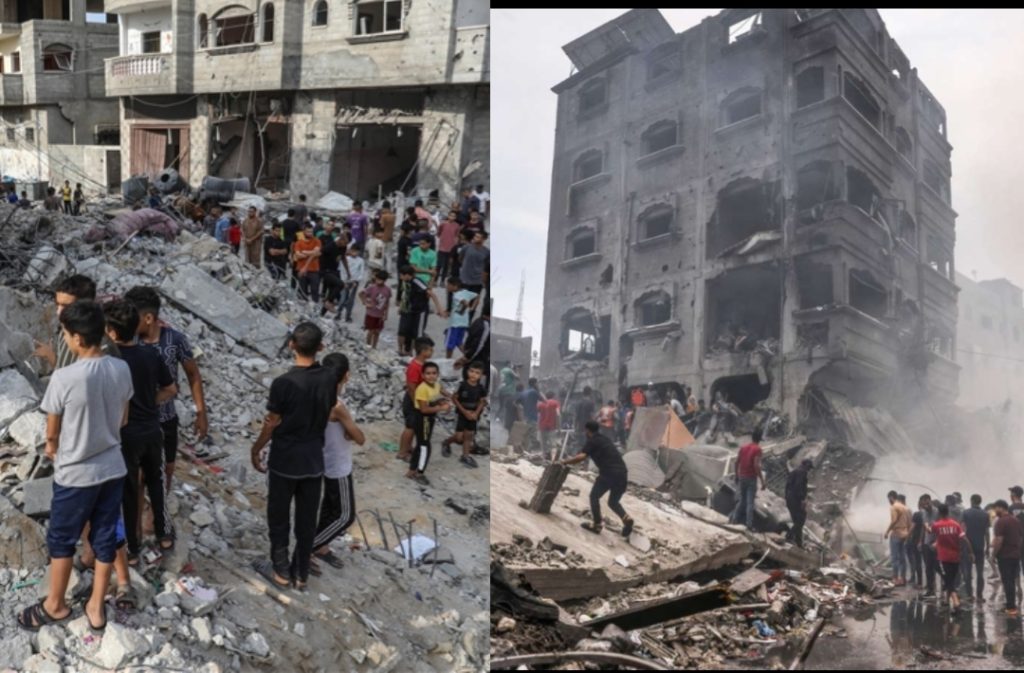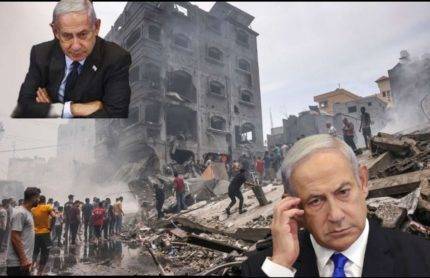In an exclusive interview with NPR, Israeli Prime Minister Benjamin Netanyahu declared that the Israeli military will persist in its campaign against Hamas in Gaza. Asserting the need to eradicate Hamas as a ruling entity, Netanyahu emphasized the importance of preventing any resurgence of terrorism. He stated, “We have to make sure that there’s no new Hamas.” Netanyahu acknowledged the dual responsibility of both military and civilian governance in the Palestinian enclave, but he refrained from specifying who he believes should lead the civilian government.
Netanyahu’s confidence in the plan was evident, although questions lingered about the future political landscape of Gaza. The Israeli Prime Minister disclosed that Israeli troops remain stationed at Gaza’s largest hospital, Al Shifa. According to Netanyahu, the military has uncovered substantial amounts of Hamas weaponry, ammunition, and bombs within the hospital premises. The assertion was accompanied by footage, released by the Israeli military, showcasing alleged evidence of Hamas militant operations within Gaza’s main medical facility.
Controversial Israeli Hamas Operations in Gaza Hospital
The Israeli military’s claims about discovering weapons and ammunition in Al Shifa hospital have raised eyebrows globally. The footage released by the military, presented as evidence of Hamas activities, includes a video tour highlighting guns and uniforms allegedly found on the premises. Critics question the authenticity of the videos, noting their propaganda-like nature and the strategic locations of the uncovered items within the hospital. Concerns are mounting that such assertions could further complicate the already dire situation in Gaza.
As Netanyahu emphasizes the need to eliminate the threat posed by Hamas, international observers are closely monitoring the developments. The alleged discoveries in Al Shifa hospital have added a layer of controversy to the conflict, prompting discussions about the veracity of the evidence presented. The implications of such allegations on the ongoing conflict and the humanitarian crisis in Gaza remain subjects of global concern.

Humanitarian Crisis Deepens in Gaza
Against the backdrop of the military offensive, the humanitarian crisis in Gaza has reached alarming proportions. Palestinian authorities report that Israeli attacks have claimed the lives of over 11,000 people, while the United Nations suggests that around 2,700 individuals, including 1,500 children, are still missing. The missing are believed to be buried under the rubble of buildings destroyed in Israeli air strikes.
The dire situation on the ground is sparking international condemnation, with many terming Israel’s actions in the Hamas conflict as detrimental to humanity. Some have gone so far as to label it genocide, raising questions about the proportionality and the impact of the military campaign on civilians. As the casualty numbers rise and the devastation unfolds, there is a growing urgency for international intervention to address the unfolding humanitarian catastrophe.
Global Criticism Mounts Against Netanyahu‘s Israeli Actions
As Netanyahu’s Israeli military charges on its offensive attacks in Gaza, they faced widespread condemnation on the global stage. Numerous countries and international organizations have expressed concern over the civilian casualties and the destruction of critical infrastructure. Critics argue that Israel’s actions are exacerbating the already dire humanitarian situation in Gaza, calling for an immediate ceasefire and diplomatic efforts to de-escalate the conflict.
President Biden’s mention of Israel blocking nearly all fuel from entering the enclave underscores the multifaceted impact of the conflict. The international community is grappling with the complexities of the situation, with differing opinions on the appropriate course of action. As the crisis unfolds, pressure mounts on world leaders to address the root causes and find a sustainable resolution to the longstanding Israeli-Palestinian conflict.
International Calls for Ceasefire and Diplomatic Resolution
Amid escalating tensions, there is a growing chorus of international voices calling for an immediate ceasefire and diplomatic efforts to bring an end to the conflict. The United Nations, key world leaders, and humanitarian organizations are urging both Israel and Hamas to de-escalate hostilities, prioritize the protection of civilians, and engage in constructive dialogue to find a lasting resolution.
The urgency for diplomatic intervention is fueled by the rising death toll, the displacement of thousands, and the increasing strain on Gaza’s already fragile infrastructure. The international community faces the challenge of navigating a complex geopolitical landscape to broker a ceasefire that addresses the root causes of the conflict and paves the way for meaningful negotiations towards a sustainable peace.
Uncertain Future and Broader Implications
As the conflict between Israel and Hamas unfolds, the future remains uncertain, with profound implications for the region and beyond. The complex geopolitical dynamics, the humanitarian crisis in Gaza, and the international response underscore the need for a comprehensive and inclusive approach to address the root causes of the conflict. The ongoing developments will shape the trajectory of the Israeli-Palestinian conflict, influencing regional stability and global diplomacy for years to come.














